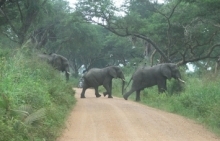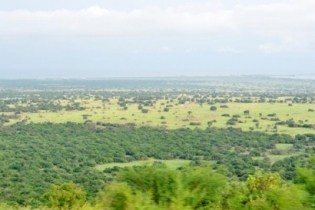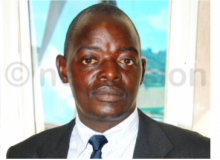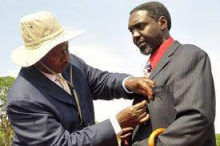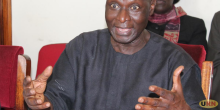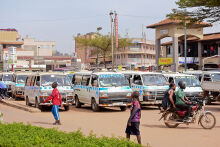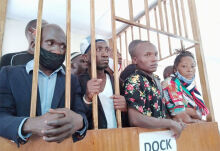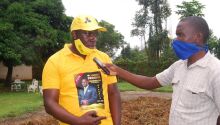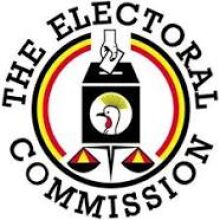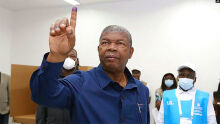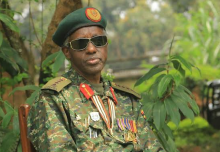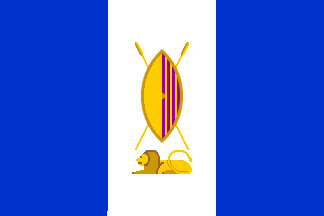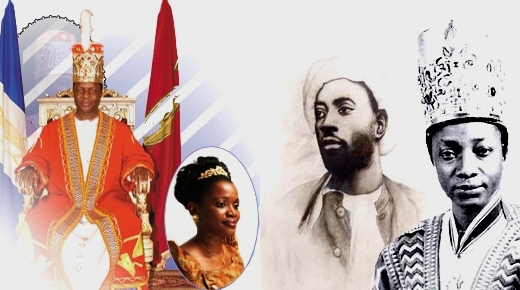ETTAMBIRO
LY'AMUKABYA AWO E KYEBANDO OKULIRAANA E KKANISA YA BAHAI E KANYANYA.
KABAKA ATYA OKUMUJJA KU BWAKABAKA
BAMUTEGEE
ZA NTI ABAZUNGU OBWAKABAKA BABUWA N'ABAKAZI.
ABAYIMBI KYEBAVA BAYIMBA NTI:
EKIMAZE EMBUZI E KYEBANDO, SSALAMBWA LY'EWAMALA.
BULI EVAAYO LIBOJJA MU BBWA.
EKIMAZE EMBUZI EZ'EKISIBO,
SSALAMBWA LY'EWAMALA,
BULI EVAAYO LIBOJJA MU BBWA.
EBYAFAAYO 1927
Abasoga nabo baaweereza entungo ensekule eri Kattikiro Apollo Kaggwa agende e Bungereza okuloopa Gavana Sir Frederick Crowford olwokumuwummuza.
Ekyakabi olwatuuka e Nairobi entungo ne bagibba. Era nalwala nanyo. Eyo gye yafiira nga 14/02/1927. Yaleetebwa n'aziikibwa e Mannyangwa nga 21/02/1927. Omuyimbi kwekuyimba bwati:
Okumanya ng'Abakyukuyu babbi, Kawalya baamubbako akatwalo k'entungo. Ab'eBusoga baamuweereza nsekule, Ate Kawalya yali musiru bambi, Anti entungo yagikubamu ejjiiko,
Yalaama nti we balinziika balimangawo entungo, Abaana gye banaalyanga, Nga bazze okulima NNUMETE KAMWA!
The Electoral and constitutional reforms in Uganda:
Posted Wednesday, February 18 2015
The compact contains a set of reforms aimed at ensuring a credible election in 2016.
Mr Godber Tumushabe, the head of the consultation secretariat of the Citizens Coalition for Free and Fair Elections, said the failure by MPs to take the reforms process seriously will compel them to move on the House.
“We have looked at the potential triggers because we are not anarchists. MPs have to invite us by their actions. We must also create a credible threat for these MPs and the President to know that if we are ignored, something big will happen,” Mr Tumushabe said on Monday.
According to their plan, the activists’ campaign will be triggered by MPs if they ignore the issues contained in the compact; if Parliament and the Executive delay in tabling and discussing the reforms and if Parliament reduces the debate on reforms to token issues.
However, Prime Minister Ruhakana Rugunda on Monday told Daily Monitor that there should be no cause for worry because government is at the forefront of pushing for reforms.
“Government is spearheading the reforms process. We shall come out with a comprehensive position and that is why government has not commented on specific reforms because we are consulting the various stakeholders.”
Key reforms proposed
• President’s tenure should be restored to two five-year terms.
• Size of Parliament should be reduced in line with modest resources of the State.
• New independent and impartial electoral commission must be established.
• New verifiable register of all voters, which should include eligible Ugandans in the diaspora, must be compiled.
• Voting for LC3, LC5, Parliament and President should be conducted on one day.
• Military should have no involvement whatsoever in the electoral process.
• President should relinquish command of the armed forces to the Joint Chiefs, and must not serve as chairman of UDPF High Command during elections.
• Workers should be removed from special interest group representation since issues of workers can be represented by all MPs.
• Army representatives should be removed from Parliament.
• The National Institute for Political Education at Kyankwanzi should be abolished and replaced by a National Institute for Administration under an independent Board of Directors.
• Cabinet ministers should not be MPs.
• The office of the Resident District Commissioner should be abolished.
sdkafeero@
ug.nationmedia.com
POLICE BRUTALITY INCITING VIOLENCE:
Written by the observer, UgandaLocal election Observers have warned that the high handedness of Uganda Police and other security agencies against opposition politicians and the public could spark off election violence.
Yesterday police arrested more than 10 Forum for Democratic Change (FDC) officials including the presidential candidate Kizza Besigye, party chairman Wasswa Birigwa, party president Gen Mugisha Muntu, Acting chairperson Joyce Ssebugwawo, FDC women league leader Ingrid Turinawe among others together with other party flag bearers in different electoral positions.
Following the arrest of the FDC politicians, demonstrations erupted in different places around the city center including; Kiseka Market, Najanankumbi, Nateete, Wandegeya and Kawempe. Police and Military Police responded to the demonstrations by firing teargas and live ammunition to disperse the protestors. Media footage showed police brutality arrest people, directly spraying some with teargas.
Crispy Kaheru, the Executive Director Citizens' Coalition for Electoral Democracy Uganda (CCEDU) says during this critical time when the electoral emotions are high, police ought to restrain from being brutal and abusing the human rights of Ugandans as it may fuel electoral violence.
"I think they raise a lot more anxiety and potentially this is the time we should be seeing security agencies, police specifically taking more restrained measures in handling such situations not arrests. At this time you want to tamper the anxieties of people not to flare them. And for me the temptation is, such arrests could end up flaring up, could end up inciting the public which could act in irrational ways. We don’t want to see that", Kaheru said.

The African Police in Uganda is showing off its true colours on the African continent.
Police has been criticized locally and internationally for brutality and abuse of human rights in past by reports from Amnesty International, Uganda Human Rights Commission and other critical bodies.
Dr Martin Mwondha, the National Coordinator Citizens Election Observers Network-Uganda (CEON-U) says, the police despite its past record was expected to help achieve a free, fair and peaceful election which they have failed.
"Police intervention in blocking the movements of any citizen or any candidate is perceived as a big infringement on the rights of people. And that is what not we expect in an electoral process that is free and fair", Mwondha said.
However the deputy police spokesperson Polly Namaye says, they have practiced restraint from arresting people despite being pushed to the limits. Police has maintained that they have not arrested any politician during this election period but rather 'inconvenienced' the illegal activities of the politicians. Media reports and footage, however say otherwise.
"Those who are trying to announce themselves winners of the election at Najjanankumbi were inconvenienced and many of them were taken to their home aboard to ensure that they don’t continue with the press briefing that they were planning to do where they would announce themselves. But we also hope that they have learnt that you can not announce yourself an election winner when people are still voting.
And anyway there is only one instituion that is mandated to announce results - that is the Electoral Commission. When we see the assemblance of people burning tyres definitely we [would] arrest them but at the moment, No, we have not arrested anybody who was involved in burning tyres and also those who are attempting to burn the [police] vehicle but we hope they don’t do it", Namaye said.
Why the Uganda police raided the hard working Non Government Organizations and run them bankrupt:
23 October, 2017
Written by Sulaiman Kakaire
In this expose, SULAIMAN KAKAIRE reveals the intricate-behind-the scenes events and government fears that led to the clampdown that has left three NGOs crippled.
A few days before September 19, when the Igara West MP Raphael Magyezi was due to introduce his private member’s bill seeking to scrap the constitutional age limits on presidential candidates, police got intelligence that a youth organisation named The Alternative Movement (TAM) had organised a massive demonstration to thwart the move.
Police intelligence had reportedly intercepted communication between the youth group’s leader, Norman Tumuhimbise, on one hand, and Godber Tumushabe, associate director of Great Lakes Institute for Strategic Studies (GLISS), a policy think tank, and Arthur Larok, the country director of Action Aid International-Uganda, on the other hand.

The gist of the intelligence information, which sources within the group told us, was to the effect that the two NGOs were bankrolling youth groups to resist the Magyezi amendment proposal.
Acting on this information, the police on September 18, without a search warrant, broke into the office of TAM at MM Plaza, along Luwum street, and searched the place to recover evidence connected to their suspicions.
“They took all our computers, seven laptops, two cameras, 10 audio recorders, our documents, 500 T-shirts and Uganda flags. We have not yet recovered all these as some of them were not even captured in the police records,” Tumuhimbise said.
Asked about his relationship with the ActionAid boss, Tumuhimbise told us last week he talks to Arthur Larok “like any other Ugandan and we can discuss anything, including politics; is there anything illegal about it? I don’t think so.”
After searching and cordoning off TAM’s offices, the police arrested 10 members of the group. These are Eria Musoke, Ferdinand Luta, Eddy Atwine, Bashir Mubiru, Ronald Muwonge, Galasi Mushizimana, Abel Mucunguzi, Johab Agaba, Edris Mutebi and Jackson Ssemwanga.
Four of these were released on September 22 without charges while the other six were released on September 27 on bail. September 27 is also the day MPs opposed to the amendment bill were battered as they were forced out of parliament by security forces.
Eron Kiiza, the TAM members’ lawyers, told The Observer on October 19, that they have sued the Attorney General and police officers Brian Kyehanagane and Alfred Ndugutse (Miscellaneous Cause no. 3 of 2017), seeking damages for illegal arrest and detention.
On the day (September 27) the last batch of TAM members was released, the police arrested their leader Norman Tumuhimbise and dumped him at Kira Road police station.
Tumuhimbise told us that while in the police cells where he spent more than a week, he was denied access to his family, relatives and friends, adding that he was also denied medicine for almost four days.
“They kept on saying that this is [Kale] Kayihura’s (inspector general of police) suspect; whatever happens to him, it is up to him [the IGP],” Tumuhimbise said.
During this time in detention, the police kept asking Tumuhimbise about his relationship with ActionAid International.
“I don’t have any links with them, I just interact with Arthur like any other person but you know they are funny. They even asked me why I had a constitution in my office,” Tumuhimbise said.
Tumuhimbise was only released after his lawyer filed for unconditional release as provided under section 25(3) of the Police Act, which provides that any person who, if arrested without an arrest warrant, spends more than 48 hours before being charged in court can apply to a magistrate’s court for unconditional release.
The application was made on October 5 at the Chief Magistrate’s court on Buganda Road before Moses Nabende, who on the same day ordered: “The applicant be unconditionally released from any police cells where he is, or be charged before court within twelve hours from 4:00pm today…Every police officer is directed to comply with the order above.”
Despite his release, Tumuhimbise’s offices remain sealed off. He said he will file a case today challenging this.
ENTER ACTIONAID
According to reliable sources, the arrest of the youths and their leader was intended to help in pinning the principals of ActionAid International and GLISS.
On September 20, two days after the police raided Tumuhimbise’s offices, AIP Henry Peter Walya applied for a search warrant in the Chief Magistrate’s court of Makindye to obtain what he called “the evidence relating to elicit transfer of funds for funding unlawful activities.”

Walya’s application was supported by an affidavit in which he stated: “It has come to my knowledge that the offices of ActionAid International- Uganda located at Diplomate Zone Kasanga are being used for illicit transfer of funds for purposes of unlawful activities.”
The application was granted by the court and on the same day, at about 4pm, the police cordoned off the head office of Action Aid International and searched the premises until the early hours of the next day.
Nicholas Opiyo, the ActionAid board chairperson, said the police vandalised the offices and grabbed some of their staff’s property during the search.
“They took some of our staff’s phones but they are yet to be recovered and some other things,” Opiyo told us.
Following the search on October 4, SSP Paul Mark Odongo, the head of Criminal Case Tracking Task Team (CCTTT), invited Arthur Larok and Bruno Ssemaganda, the head of Finance at ActionAid, for interviewing on October 6.
Opiyo, who is also a lawyer, told us that the two (Larok and Tumushabe) were questioned about treason and subversive activities.
“It is surprising that during the interviews at CCTTT, our clients were asked things not connected to illicit money transfers,” Opiyo said.
Three days before the ActionAid team was questioned, the deputy governor of Bank of Uganda, Dr Louis Kasekende, had written to the managing director of Standard Chartered bank, directing him to immediately freeze all the organisation’s accounts.
“The accounts in question shall remain frozen until otherwise advised by Bank of Uganda,” the letter stated, adding that the directive was in respect of ongoing criminal investigations into the organisation’s alleged conspiracy to commit a felony and money laundering.
On October 13, ActionAid International Uganda wrote to Financial Intelligence Authority (FIA), the body mandated to monitor money laundering, demanding to establish whether they are under investigation.
FIA is yet to respond to ActionAid although its boss Sydney Asubo told The Observer that they had now started investigations.
Opiyo is convinced, having consulted sources within FIA, that ActionAid wasn’t under FIA investigation, and that the state is acting retrospectively to cover its tracks.
“If FIA is not in charge of this investigation, then where does Bank of Uganda get the powers to act without due information, or where did the police get the information it based on to write to Bank of Uganda, who in turn ordered for the freezing of our accounts?” Opiyo asked.
But FIA director Asubo told us: “We have received the documents and more information, and our investigations are to find out whether they conform to the definition of money laundering.”
Asked whether they were given the information before BOU froze the NGO’s accounts or afterwards, Asubo said “it was concurrent.”
On August 4, 2017 cabinet got a report from FIA analysing the money laundering threat to Uganda and the major predicate offenses that generate larger amounts of criminal proceeds, and the level of the terror financing threat that the country faces.
The report titled “Money Laundering and Terrorist Financing National Risk Assessment Report” found that; “the risk for NGOs is also medium-high and it is mostly driven by the lack of supervision and the near-absence of implementation of AML/CFT requirements, rather than by vulnerabilities inherent to the types or activities of the NGOs operating in the country.”
The report, which assessed how criminals utilize the ill-gotten funds and the methods they use to launder criminal proceeds, however notes: “[the NGO] sector’s legislation has been recently revamped, but there are still significant capacity issues and lack of awareness, which translate in almost non-existence of AML/CFT oversight and near absence of implementation of AML/CFT measures.”

The Observer has seen a copy of the report but it does not mention TAM, ActionAid or GLISS yet it discusses other organisations suspected of money laundering.
We have learnt that ActionAid has since decided to challenge in court the actions of government agencies (Police, Bank of Uganda and others), which they believe to be illegal.
“We are going to court and we need immediate action on this because people who benefit from our work are being affected; these include the orphaned that the organisation pays fees for and our staff who have not accessed their salaries,” Opiyo said.
It is understood that over Shs 7 billion is stashed in the five accounts that were frozen.
TUMUSHABE'S WOES
Like Action Aid, GLISS too was ransacked and its head Godber Tumushabe summoned for questioning.
“They came and took all our property, including laptops, computers, documents and many other things,” Tumushabe said, looking around his largely empty office that had only a scanner left.
Tumushabe’s troubles are also in connection with suspected financing of civil defiance against the age limit amendment.
“In fact, when they came here they took our shirts that were marked ‘AGE LIMIT IS THE LIMIT’; according to them that was illegal,” Tumushabe said, maintaining that whatever he was doing is legal and constitutional.
For Tumushabe it wasn’t the first brush with the state. Around 2013 he was forced out of Advocates Coalition for Development (ACODE) on grounds that he was participating in partisan politics contrary to the NGO’s mandate.
At the time, Tumushabe had through ACODE sponsored the oil debate in parliament and also facilitated the MPs’ capacity building training during heated discussions on the oil and gas sector legislations.
“I was told by the board of ACODE that I either choose to be ED or leave. I had to choose being a citizen. I cannot be sub-consumed by a start-up like ACODE or GLISS,” he said.
But Tumushabe was soon followed to his new home - GLISS. In 2015, his nascent organisation was placed under investigation.
In a report dated August 2015, Uganda Registration Services Bureau found that GLISS, and Tumushabe in particular, were participating in activities beyond their mandate. When he appeared for interrogation, Tumushabe was asked why he mobilises for the opposition.
“Their query was that, why did I draft the FDC policy agenda, [and] play an important role in The Democratic Alliance and the campaign for free and fair elections?
“But my response is, what is illegal about it? I am a citizen of Uganda and I participate in all that as a citizen, not GLISS; GLISS is a policy think tank engaged in policy research and it only gets involved when something is about governance and rule of law, which is part of its mandate,” Tumushabe said.
AGE LIMIT CONNECTION
According to Tumushabe, this clampdown is not about law enforcement or compliance.
“Telling us to file our sources of funding is not the issue. We have been complying, that is why this did not originate from URA, NSSF, URSB or FIA; to use any of those entities is escapism,” he said.
“They are scared that the NGOs, being the only organised entities with [more] resources than the opposition parties; they are competent enough to challenge government,” Tumushabe said, pointing at the strength of ActionAid.
“It has grassroots NGOs across the country; so, they fear that if it has its accounts operating, it can, through its program of civic education, facilitate the local NGOs to counter the ongoing consultations on removal of term limits.”
The National Bureau for NGOs estimates that approximately 12,800 NGOs are registered in Uganda, of which only 3,000 are actively operating in the country.
Majority of these (191) are involved in human rights and governance advocacy. The state believes through its intelligence gathering that more than $500 million has been sent to various NGOs by donors and global campaigners of good governance to counter the age limit removal.
Ofwono Opondo, the executive director of Uganda Media Centre, couldn’t be reached for a comment since last Wednesday.
Amid growing opposition, the government has increasingly blamed NGOs for supporting its foes financially and sought to squeeze them.
Analysts suggest that the state is targeting NGOs after successfully demobilising opposition political parties only to realise that civil society groups are giving the same opposition a lifeline.
Moreover, unlike the parties which are starved of funds and bedevilled by conflicts, NGOs are well funded and organised.
Nicholas Opiyo, also executive director of Chapter Four, a human rights organisation, knows why the government is increasingly targeting NGOs.
“If you look at the most popular campaigns; The Democratic Alliance (TDA), Free and Fair Elections Campaigns, Citizens’ Manifesto, FDC Policy Agenda, or internal elections for parties; they are all activities [aided by] NGOs,” Opiyo said.
Realising the NGOs’ growing power, the government in 2016 enacted the NGO Act, which has provisions intended to curtail civil society’s participation in governance issues.
Under section 44 of the NGO Act, an organisation shall not engage in any act which is prejudicial to the security and laws of Uganda. NGOs must also be “non-partisan” and must not engage in fundraising or campaigning to support or oppose any political party or candidate for an appointive or elective political office.
They may not propose or register a candidate for elective political office. NGOs are further required to operate only in the sectors in respect of which they were registered.
It is believed that the government intends to invoke such provisions to curtail the activities of organisations such as ActionAid, GLISS and TAM.
But the NGO community is not sitting back. On Wednesday last week, several local and international NGOs met in Kampala to discuss how to move forward, and one of the things they are considering is going to court to seek remedies.
Nb
What would one expect of a bank robber turned politician to do with other people's commercial entities when they are in the same market place?
IT IS NOT LEGAL TO BAN THE POLITICAL PARTY OF KY:
Uganda Government printing and publishing corporation, is slowly realizing the benefits of providing digital services to its 15 tribal states that make up this country:
It is still a pipe dream to communicate effectively using digital technology to its 15 tribal native states in their own various African vernacular languages. These are God given human communicative languages which modern digital technology is rapidly enhancing amongst the thousands of African communities world wide.
8 December, 2023
World Media
The Uganda Printing and Publishing Corporation (UPPC) has officially digitized the Uganda Gazette. This aims to enhance both accessibility and affordability in response to the requirements of the digital age.
For years, the Uganda Gazette, serving as the official repository for legal documents and government records, has been exclusively available in print. However, acknowledging the increasing preference towards digital platforms, the Gazette is now embracing a transformative shift.
Prof Sudi Nangoli, UPPC managing director, says the shift from traditional hardcopy to the online platform aims to enhance accessibility and convenience for all Ugandans.
"We made initial efforts to go digital and scaled back, but now we are officially launching the e-gazette. We must keep up with trends as the world moves towards digital, and we cannot remain confined to traditional hard copy," said Prof Nangoli.
Nangoli adds that the e-version of the Gazette is not only affordable compared to the hardcopy but also eliminates the burden of dealing with physical papers that may go missing or misplaced.
"The annual subscription fee for the hardcopy Gazette is Shs 1.4 million, while the e-gazette is only Shs 800,000. This means that for just an additional 100,000, one can subscribe to the Gazette for two years. For a nominal fee of Shs 3,000, users can now have the entire Gazette at their fingertips than paying Shs 5,000 for the hard copy,” says Nangoli.
The Uganda Gazette, issued weekly by the UPPC and is usually available on Fridays. Nonetheless, an extraordinary Gazette may be issued on any day as required. This publication consistently includes vital information such as legal notifications, statutory instruments, electoral notices, and private legal announcements.
The latter covers a range of topics, including bankruptcies, company registrations and closures, probate proceedings, company by-laws, and changes in names (deed polls), among other significant updates.
Despite its rich content, the Uganda Gazette experiences limited circulation as a result of a constrained number of outlets. This limitation restricts access to this publication, which should ideally be essential to the general audience.
Rebecca Nyakairu, spokesperson of UPPC, says the e-gazette will overcome limitations by extending its reach into the public domain. She adds that through the digitalization process, the Gazette transforms into a globally accessible resource with just a click on digital devices, catering to a broader audience.
"People now have the convenience of accessing the Gazette online, whether at home using laptops, phones, or any preferred devices," said Nyakairu.
However, Nyakairu stressed that the digital transition doesn't mark the demise of the hard copy version.
To access the e-gazette, individuals need to subscribe by opening an account on the UPPC website and navigating to the 'e.resources' option.
The e-gazette aligns with UPPC's recently revealed five-year strategic plan, wherein the chief government printer aims to leverage technology to enhance its products. During the launch of the strategic plan in September this year, Nangoli assured that 80 per cent of their product offerings will be digitized by 2026.
"As we navigate an increasingly digital landscape, we will harness the power of technology to enhance our products and services for the convenience of our stakeholders," Nangoli stated, emphasizing that this move is one of their objectives to protect the environment and improve operational efficiency.
Around the world, a growing number of countries have embraced digitalization by transitioning their official gazettes from traditional print formats to online platforms. The move towards online gazettes aligns with the global trend of leveraging technology to make official publications more accessible and user-friendly in the digital age.
Nb
"However, Nyakairu stressed that the digital transition doesn't mark the demise of the hard copy version." Nyakairu my dear, times have changed very much. The way you are saying it is what many customers of digital technology are saying. That the wire telephone will gradually disappear from use in this world! Your attitude like that of the President of Uganda is very backward. He said that digital media is all about "lugambo" and should be heavily taxed, or banned or neglected in the present modern lifestyle of most people of this world. No wonder your government publications are all quiet about informing the people of Uganda about their politics and all business, in their own 15 official vernacular and native languages. One believes the recent third or fourth constitution of this country instructs government to do exactly that.
President Museveni of Uganda, has tainted the image of State House in an independent African country of Uganda:

On Wednesday December 3, Oskar Semweya-Musoke rang to ask me whether I would be available at the weekend for the weekly Capital Gang talk show on Capital Radio. Oskar usually informs me of the topic and checks on my availability on Thursday evening or Friday. Why was he doing it on Wednesday?
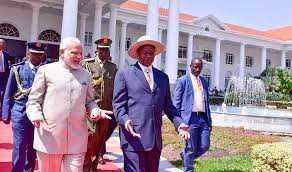 President Museveni and many of his visitors at State House
President Museveni and many of his visitors at State House
He told me President Museveni had accepted a Capital Radio request to feature on the popular Saturday talk show but on condition that we record it a day earlier (Friday, December 5) and at State House.
“State House!? I asked Oskar, and he replied: “Yes, State House.” I immediately expressed reservations going to State House. Oskar pleaded with me, informing me that Capital Radio listeners had already declared it a no-show if Bugweri MP Abdu Katuntu and I did not feature.
Within seconds, I had to look for the excuse and the FDC delegates’ conference to which I am a member came in my mind. “But this is a two-hour recording.” Oskar shot back. To search for a reasonable excuse not to go to State House, I told Oskar it was okay so he could hang up.
Serious soul-searching followed this telephone conversation. The journalist in me pleaded that I should go but the politician refused. Later in the evening, my wife advised that I consult close political colleagues. Later in the night I gathered the courage and convinced myself to make this treacherous journey to State House Entebbe.
That is how deep the image of State House has sunk under President Museveni: sunk because the head of state has turned this public facility into a bribery centre. It is here that sacks of money are handed out. Everybody that visits State House goes there for material benefit.
This hill with a very good view of Lake Victoria is no longer a place for constructive discussion on moving the country forward but a cool place for striking personal deals. It is the reason Lord Mayor Ssalongo Erias Lukwago turned down Museveni’s invitation.
The moment you step there, the whole world begins thinking you have actually been compromised. So bad is the situation that the country has now almost been surrendered to Museveni. Entebbe State House land title is not in Museveni’s name but the man has personalised it.
In fact, a minister from Busoga rang me on Friday evening to thank me for “dining with Mzee.” The NRM people on the publicity committee that found us waiting for Museveni spread the news quickly that, “Mzee has netted another opposition big fish.” That is the feeling even among Museveni supporters! And as we were there, tents were being arranged for a meeting between NRM youth leaders and Museveni.
And that is the point I made to him when the recording of the show finally started – personalisation of the state and abuse of public resources. For declaring him life president in Kyankwanzi, each NRM MP has been given Shs 150 million totalling to about Shs 45 billion.
The country doesn’t have Shs 40 billion to buy ambulances for regional and general referral hospitals but Museveni has Shs 45 billion to bribe MPs! The ministry of Agriculture wants about Shs 300 billion for seedlings to kick-start agriculture. It has been given only Shs 8 billion yet Museveni has Shs 20 billion to spend on the 10,000 NRM delegates coming for the December 14 conference (an average of Shs 2m per delegate).
The whole state has been set in motion to bribe and harass citizens so they can allow the emperor rule for life. It is the reason Museveni has hounded out from the state and his party contemporaries who can look into his eyes and tell him, “no sir”. He has assembled a team of energetic cheerleaders who I think see him as a god.
The discipline of Capital Gang is such that you listen to each other but I found it difficult listening to the head of state tell one lie after another. I ended up interrupting him to the annoyance of his minister for Presidency, Frank Tumwebaze. This Tumwebaze man had not been in the room when the show started but he came panting, whispering to other aides of how Mzee was needed elsewhere. He sat next to me and kept murmuring each time I interrupted Museveni.
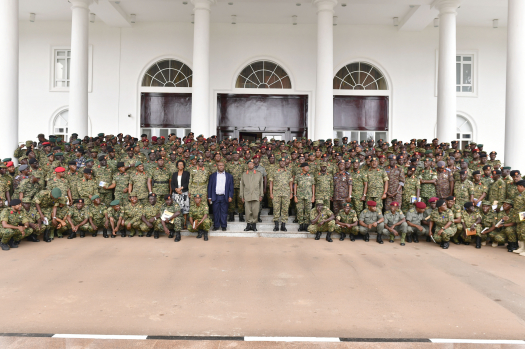 The Uganda military at State House
The Uganda military at State House
Finally, as we were concluding, Tumwebaze grabbed my microphone and pushed it away. Yes, Museveni is a bad leader but still courteous, at least before cameras. He ordered Tumwebaze to immediately return my microphone.
And what had I said that incensed this rabid admirer of Museveni? That it is him (Museveni) who appointed his wife a minister and not the people of Ruhaama he was now attempting to accuse. The matter of nepotism is a serious offence that I wanted Museveni to answer.
Certainly the late Eriya Kategaya, Nuwe Amanya Mushega, Mugisha Muntu, James Wapakhabulo and Kizza Besigye would never have done it. Tumwebaze occupies a senior cabinet position and that is how he behaves. Do you really think there is no debate on him remaining in cabinet? God bless our country.
